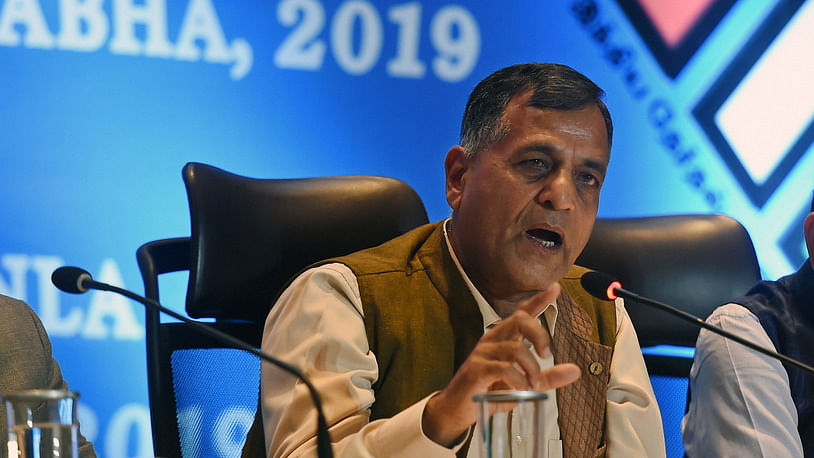The Election Commission of India and its members are under enormous fire on account of their (mis)conduct during the ongoing assembly elections. Barring a few exceptions, almost everyone — now even a high court — has condemned the poll panel’s inaction during the Covid-19 pandemic. The election rallies have been massive spreaders of Covid. The Election Commission could and should have intervened and controlled this madness, instead of bringing disrepute to this august institution.
The Election Commission of India (ECI) is a constitutional body and the Chief Election Commissioner (CEC) cannot be removed from their position except through a process of impeachment. Thus, there is sufficient protection available. That is also the reason why successive election commissioners have held their head high and strengthened the institution. There is absolutely no reason at least for the CEC to succumb. Or, so we thought.
Also read: EC officials may be booked under murder charges, says Madras HC on election rallies
To toe or not to toe the line
What happened to Ashok Lavasa — member of the ECI from January 2018 to August 2020 — perhaps changed it all. He was made the election commissioner after due diligence. On occupying the position, Lavasa apparently chose to take an “independent” view on certain issues. Suddenly, cases against his family members were opened up, and later cleared. Being the senior most, Lavasa would have been the logical choice for the post of CEC at a crucial time when assembly elections were to be held in some states. He dithered but finally chose not to put up a fight and went on to join the Asian Development Bank. The message was loud and clear.
It is difficult to determine the exact contribution Ashok Lavasa’s case made in pushing the election commissioners to ‘toe the line’. There would have been other factors contributing to such a (mis)conduct on the part of the election commissioners, so much so that the Madras High Court bench of Chief Justice Sanjib Banerjee and Justice Senthilkumar Ramamoorthy made the following remark against the ECI Monday:
“You are the only institution that is responsible for the situation today. No action against political parties taking rallies despite every order of the court. Your election commission should be put on murder charges probably”.
Harsh words indeed.
There has been an ongoing practice for many decades to ‘reward’ those who occupied constitutional posts after their tenure is over. It would be wrong to blame only the current dispensation for this. Judges and many civil servants have been ‘benefitting’ out of this pernicious practice. In the context of the ECI, there was an isolated case of a former CEC joining a political party and then being made a Union minister. There are media reports that former CEC Sunil Arora, who completed his tenure this month, may be made the governor of Goa. One can only hope it doesn’t happen, else it will lend credence to the accusations of partisan behaviour during his tenure.
Also read: ‘Only God or TN Seshan’ — why politicians feared the ex-CEC who was an inspiration to many
ECs giving a bad name to civil services
The decisions that the ECI takes are largely difficult and sensitive ones. It can’t please everyone. In fact, the decisions should not be to please or displease someone. The ECI is supposed to carry out the process of elections objectively. This is what this august institution prided in and was known for. The objectivity of the ECI is being questioned now as never before. The manner in which the election has been planned and rolled out in West Bengal has left everyone wondering. The necessity of conducting the election in eight phases when the country is facing an unprecedented health crisis is being questioned. The ECI turning a blind eye towards violation of Covid norms and allowing election rallies to happen has left everyone aghast. The poll panel could and should have managed it well.
The ECI has a tough and unenviable job. But it was always so. And, it managed to keep its neck above the water. Did the Ashok Lavasa incident change everything? Or, are the election commissioners too looking for additional rewards? I have no doubt that the election commissioners would want to restore the sanctity and credibility of the institution. But to do so, they will first have to admit that something is amiss. And even if they admit, the key question is whether they have the spine to do what they think is correct. When T.N. Seshan did what he did, he didn’t require new legislation. He used the existing rules to strengthen the structure. However, it required guts and attitude. Do the current election commissioners have Seshan’s guts and attitude? Some people argue, perhaps unfairly, that they wouldn’t be where they are if they were perceived to have these attributes.
Despite the fact that a large number of civil servants are toiling hard to grapple with the fallout of the Covid-19 pandemic, the general impression about them is created by those that occupy high-profile positions like election commissioners. In the current instance as well, the (in)action and partisan attitude of the election commissioners has resulted in bringing a bad name to the civil services even though these are exceptions. There are a number of other commissioners, like the ones at Brihanmumbai Municipal Corporation, who hold much more vulnerable positions, but are turning it around through exemplary leadership qualities and hard work without due recognition.
There are indeed all types of civil servants. If pliability and allegiance become the prime criteria for posting officers, we will get officers who give a bad name to civil services. However, if the criteria are honesty and efficiency, we will have more Seshans and Ribeiros amid us. The choice is with the decision maker.
The author is a retired civil servant and former secretary in the government of India. Views are personal.
(Edited by Prashant Dixit)
